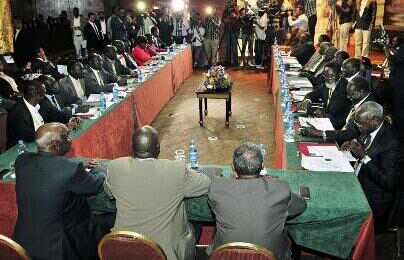South Sudanese parties to resume negotiations on security arrangements
October 19, 2015 (ADDIS ABABA) – South Sudanese rival parties led by president Salva Kiir and armed opposition leader, Riek Machar, who signed a peace agreement in August to end the 21-month long civil war in the country, are set to resume negotiations to finalize security arrangements in implementation of the accord, opposition official has confirmed.

Senior military leaders from both parties last month failed to agree on details of the security arrangements to demilitarize the national capital, Juba, and other state capitals and major towns, as well as sizes and compositions of joint military and police forces.
The parties however agreed on a number of points including areas of cantonment/assembly of the forces.
In Juba, information minister, Michael Makuei Lueth, confirmed the meeting saying it will be held between 20 and 21 in the Ethiopian capital of Addis Ababa. He said the two rival sides are expected to come out with clear plan to implement the peace agreement as well as reaching a consensus over the security arrangement matrix to implement permanent ceasefire.
“We have received an invitation from IGAD (intergovernmental Authority on Development) to attend a peace implementation workshop. The meeting will take place between 20 and 21 this month. So our members will be going today so that they participate at this meeting. We don’t know the agenda. We are told it is about peace implementation,” said Lueth told reporters on Monday.
A workshop conducted in the Ethiopian capital, Addis Ababa, from 13-18 September however only produced disharmonized minutes which the government signed but the opposition refused to sign, claiming the document was not shared among the parties by the IGAD mediation for final deliberations and adoption prior to initialing by the government and representatives of former detainees.
In the minutes the government asked to keep in Juba up to 5,000 soldiers to guide bases, barracks and warehouses, in addition to thousands more from the presidential guards, in addition to an unknown number of police forces. The opposition, known as the SPLM-IO rejected the government’s proposal, arguing that it was contrary to the spirit to demilitarize Juba as provided for in the peace agreement.
SPLM-IO on the other hand had been demanding a joint police force of 3,000, with composition of 1,500 from each side. It also wanted a small number of joint presidential guards in their hundreds, rejecting the government’s proposal of thousands of guards to remain Juba.
To this effect, the opposition faction earlier warned that its leadership might not return to Juba in December as planned unless the contentious issues were addressed.
However, Dak commended the scheduled resumption of the negotiations by the rival parties in order to agree on the outstanding issues in the security arrangements.
“Our team is ready to resume the discussions in the next few days on the contentious issues. We also learnt that government’s team may arrive in Addis Ababa any time soon. This is commendable. We want the matter tackled so that implementation of the peace agreement can kick off on the ground in Juba and in other locations,” Dak added.
The SPLM (IO) chief negotiator, Taban Deng Gai, he said, will lead the discussions organized by the East African regional bloc, IGAD, which facilitates the talks on implementation of the peace deal.
He also revealed that an advance team from the SPLM (IO) will travel to Juba once the security arrangements and other concerns, including president Kiir’s unilateral creation of 28 states, were addressed.
“We also hope that president Kiir will freeze his unilateral decision to create 28 states,” he added.
The parties signed the agreement with power sharing formula which is strictly based on the current 10 states in the country. The opposition during the 20-month long negotiations tabled creation of 21 states based on former British colonial districts, but the government refused, arguing it was not time to create more states or go for federalism.
A process of permanent constitution making is supposed to commence during the agreed 30 months of transitional period, which will also tackle the system of governance including federalism and creation of more states.
(ST)
